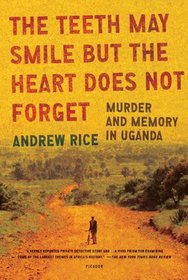Search -
The Teeth May Smile but the Heart Does Not Forget: Murder and Memory in Uganda
The Teeth May Smile but the Heart Does Not Forget Murder and Memory in Uganda
Author:
One of Kirkus Reviews' Best Books of 2009The people of Uganda have long struggled to bury the worst of their history, but after the violent reign of Idi Amin, reminders were never far from view. In 2000, lawyer Duncan Laki came across a clue to his father's 1972 disappearance, and the ensuing search ultimately led him to a shallow ... more »
Author:
One of Kirkus Reviews' Best Books of 2009The people of Uganda have long struggled to bury the worst of their history, but after the violent reign of Idi Amin, reminders were never far from view. In 2000, lawyer Duncan Laki came across a clue to his father's 1972 disappearance, and the ensuing search ultimately led him to a shallow ... more »
The Market's bargain prices are even better for Paperbackswap club members!
Retail Price: Buy New (Paperback): $14.79 (save 26%) or
Become a PBS member and pay $10.89+1 PBS book credit
![header=[] body=[Get a free book credit right now by joining the club and listing 5 books you have and are willing to share with other members!] Help icon](/images/question.gif?v=90afaeb39) (save 45%)
(save 45%)ISBN-13: 9780312429737
ISBN-10: 0312429738
Publication Date: 6/22/2010
Pages: 384
Edition: 1
Rating: 1
ISBN-10: 0312429738
Publication Date: 6/22/2010
Pages: 384
Edition: 1
Rating: 1
5 stars, based on 1 rating
Publisher: Picador
Book Type: Paperback
Other Versions: Hardcover
Members Wishing: 2
Reviews: Amazon | Write a Review
Book Type: Paperback
Other Versions: Hardcover
Members Wishing: 2
Reviews: Amazon | Write a Review
Genres:
- History >> Africa >> Uganda
- History >> Africa >> Central Africa
- History >> Africa >> East Africa
- History >> Africa >> West Africa
- Biographies & Memoirs >> True Crime >> Murder & Mayhem
- Law >> Legal Theory & Systems >> Legal History




